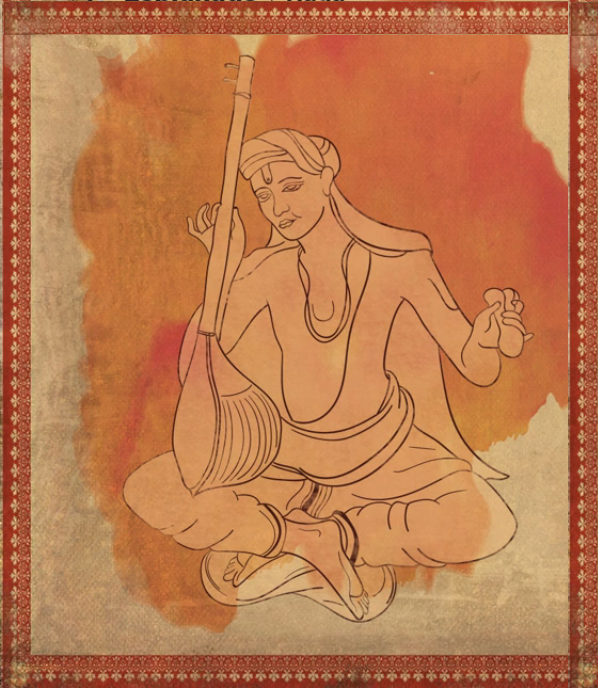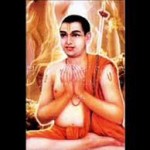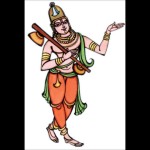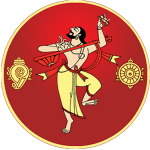The following post was composed by Ashok Madhav garu, vaggeyakara.
Thyagaraja – the most admired of the musical trinity – as his name suggests sacrificed everything – all worldly pleasures and comforts of life.
He was an ardent bhakta of Lord Rama and he devoted his entire life composing immortal kritis dedicated mostly to Lord Rama. The Thanjavur kings who were connoisseurs of classical music and fine arts, invited him numerous times to come to their court as Asthana Vidwan, but he repeatedly refused patronage, honours and gifts from the kings as well as other wealthy zamindars and smaller princes. The only gift he willingly accepted was a portrait of Lord Rama presented to him by his disciple Walajapet Venkataramana Bhagavatar. When Thyagaraja was offered this portrait he was so overcome with happy emotion that he composed the beautiful kriti in Mohana ragam “Nannu palimpa nadachi vacchitivo”-Did you come all the way to bless me , O Rama?
Thyagaraja’s voluminous output of kritis is remarkable for their musical and poetic excellence which exude with spiritual and philosophical aspects of life. The philosophical contents of his kritis are as great as the Upanishads and his kritis are often referred to as “Tyagarajopanishad”. The kritis have an universal appeal. In many of the kritis, Thyagaraja describes his aspirations of reaching the Supreme through his steadfast devotion to Lord Rama. He condemns flattery of mortals (narastuti)and does not hesitate to chide greed and jealousy.
Thyagaraja has been rightly compared to Sage Narada for his musical greatness, and to Valmiki for his poetic excellence in the following shloka:
Vyaso naigama charchaya mrudugira Valmika janmamunihi
Vyragye Shuka eva bhakti vishaye Prahalada eva swayam
Brahma Narada evacha apratimayoh sahitya sangitayoh.
Yo Ramabhakta pada nirjita shivastham Sri Tyagarajam bhaje
In the kriti Ramakatha sudha rasa panamu set in Madhyamavathi ragam, Thyagaraja describes the four aspects of dharma, artha, kama, moksha (Purusharthas) to rid oneself from the bondage of life, and unite with the Supreme God. Another kriti set in Purvikalyani, Para loka sadhana, echoes similar sentiments.
https://www.youtube.com/watch?v=gdK3X2Imvyw&list=PL6DNFg5ADQzBK2Gf6pWcRW_M3y6rOqrI-
In the kriti Bhajana seyu margamunu joopave (Narayani Ragam), Thyagaraja pleads with Rama to show him the ways for “Ramabhajana” and later on he expresses that “Ramabhakti” is realized by one’s personal experience leading to Brahmanandam as put forth in his Shuddha bangala kriti – Ramabhakti Samrajyam.
His absolute devotion to Sri Rama is brought out in the kriti ( Entani ne varnintunu sabhari bhagya – Mukhari Raga) where he feels envious of Sabari’s good fortune and privilege in being able to reach Lord Rama with such ease. Finally, after many years of tireless devotion to Rama, Thyagaraja expresses his joy in the Saranga ragam kriti – Enta Bhagyamu – for having been fortunate to have his protection.
His disdain of material wealth is well documented in several of his kritis such as “ Innalu daya rakunda vainamemi ( ragam- Narayanagoula) and Nee japamulu navanidhulou and in his Varija Nayana (Kedaragoula ragam). He was vehemently opposed to kings giving hand-outs and gifts to their sycophants. His Goulipanthu kriti- Kasichedde goppayenura kalilo rajulagu reflects his feelings.
In Nidhi chala sukhama Ramuni sannidhi seva sukhama (kalyani ragam), Thyagaraja questions the need for flattery of mortals (as the Thanjavur king approaches him with gifts) and reiterates his constant devotion to his Lord Rama. Maharajah Swathi Thirunal sent a special emissary to invite Thyagaraja to his court in Thiruvanathapuram. The Wodeyar king of Mysore also attempted to request Thyagaraja to come to his Mysore court, invariably these invitations were declined.
It is interesting to note that in all of Thyagaraja’s kritis, he uses words like, Thyagarajanuta, Thyagaragachita, which probably identifies his mudra or his signature, but this actually refers to Lord Shiva- Thyagaraja being another name for Shiva- the presiding deity of Thiruvarur, the birth place of Thyagaraja.
Many of Thyagaraja’s disciples were so enthralled by his musical greatness that they have eulogised him as a visionary. Great vaggeyakaras like Veena Kuppaiyer, Mysore Sadashiva Rao, Poochi Srinivasa Iyengar, Mysore Vasudevacharya and others have composed kritis in praise of Thyagaraja – the immortal bard of Thiruvaiyaru.
Thyagaraja’s influence on musicians and scholars of music has been so tremendous and pervasive that even after a century and a half after his demise, the legacy of his music continues to be enjoyed by Carnatic music enthusiasts all over the globe.
https://www.youtube.com/watch?v=HG9f6Rqcths
The author of this post, Ashok Madhav garu, is an accomplished Carnatic composer who has composed in all 72 Melakarta ragas. We thank him for his kind permission to print this piece.
Disclaimer: This article represents the opinions of the Author, and should not be considered a reflection of the views of the Andhra Cultural Portal. The Author is responsible for ensuring the factual veracity of the content, herein.






